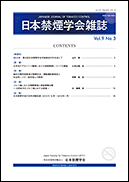Purpose: This study investigated whether differences in awareness of and attitudes towards smoking and second-hand smoke among university first-year students were affected by students’ own personal backgrounds, particularly their own smoking experience and their parents’ smoking status. The aim of this study was to gather information for use in aiding awareness and prevention of smoking and second-hand smoke among first-year students, and advising them in issues of health care management.
Method: Participants in this study were first-year students enrolled at Nayoro City University (or Junior College) in 2014 and 2015. The survey was conducted via an anonymous, self-administered, and semi-structured questionnaire that included questions concerning attitudes toward smoking and second-hand smoke.
Results: KTSND scores and second-hand smoke tolerance scores were significantly higher among those with smoking experience (3.5 points, 2.0 points, respectively) than among those without any smoking experience. As for the parent’s smoking status, KTSND scores among those whose mother currently smokes were 1.3 points significantly higher.
Discussion: Mothers’ smoking status strongly affected students’ own smoking experience. Students with smoking experience as minors (under age 20) had an inclination to tolerate smoking behaviors and secondhand smoke.
Conclusion: It is necessary to implement positive interventions at universities before students reach the age of majority at twenty years old.
View full abstract
